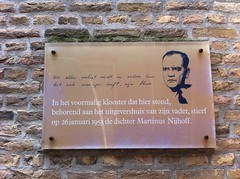Martinus Nijhoff
Commemorated on 1 plaque
'Wie alles verlaat vindt in vaders huis dat vele woningen heeft, zijn thuis'. In het voormalig klooster dat hier stond, behorend aan het uitgevershuis van zijn vader, stierf op 26 januari 1953 de dichter Martinus Nijhoff
English translation:
Kleine Kazernestraat 1, Den Haag, Netherlands where they died (1953)


